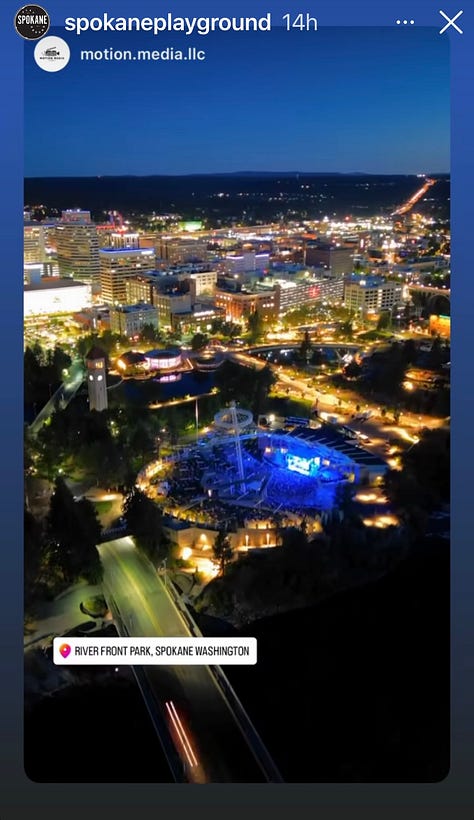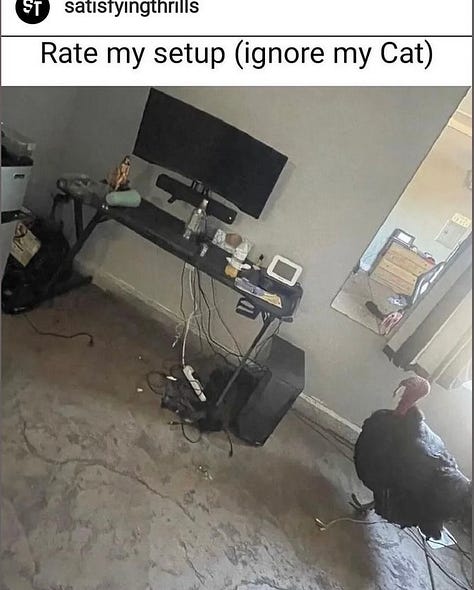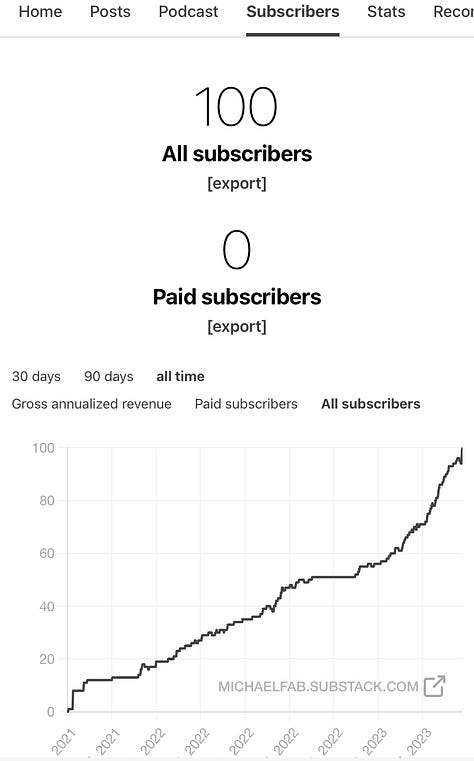Welcome to The Famous Thursday Post! Last week I promised to reveal the inspiration behind the name for these Thursday editions of Michael Acoustic:
“"Famous Blue Raincoat" [is a] Song by Leonard Cohen from the album Songs of Love and Hate Released: 1971 Genre: Folk Length: 5:09 Label: Columbia
Songwriter: Leonard Cohen Producer: Bob Johnston
"Famous Blue Raincoat" … The song is written in the form of a letter (many of the lines are written in amphibrachs). The lyric tells the story of a love triangle among the speaker, a woman named Jane, and the male addressee, who is identified only briefly as "my brother, my killer."[1]
In 1994 Cohen said that "it was a song I've never been satisfied with"…” (Ed. - I hear ya on that one, brother…)
Credit: Wikipedia Link: Famous Blue Raincoat Note: Amphibrach (yeah, I didn’t know either…)
Yesterday, we learned Ms. Sinéad O'Connor had passed. Rest In Peace.
Also, Rest In Peace, Mr. Tony Bennett. This is one of my favorite covers of this song (written in 1936 by Jerome Kern and Dorothy Fields, and covered of course, by many).
I confess though, with apologies to Mr. Bennett’s (and Mr. Sinatra’s) legacy of great music, my absolute favorite homage to the song was in, of all things, a old beer commercial:
So. Perhaps a controversial opinion, but since I’m far too old to care, I’d just like to point out that I sometimes think women should be required to have some sort of license in order to smile at you that way….
(Ed. Not an endorsement of the brand of beer. For the record, Mr. Prine turned me on to Smithwicks via lyrics in his song “When I Get To Heaven”, though I still don’t know if he wanted to give his critics a pint solely because he didn’t like it. Rolling Rock seems to be the brand most of my musician friends and I drink (occasionally, and in moderation) - I suppose it’s the subtle nod to Rock ‘n Roll…Also, still not endorsements….)
Our focus on Thursdays is on songwriting, recording, production and commercial release, and today I want to talk a little about something I’ve mentioned before: “syllable counts”. What that means is literally counting the syllables in a line of the song. Why? The reason for me, and your mileage may vary, is to establish a “pattern” within the lines of a structure (structure in this context means the “structures” of a song: verses, choruses, the bridge, tag, maybe pre-choruses if you’re using them). The pattern helps me to figure out the musical accompaniment, except for when I do it the other way around, mostly.
An example, the first verse of my song, “Long Road Back”:
Verse 1
1 2 3 4 5
It’s a long road back
1 2 3 4
Dark and narrow
1 2 3 4 5
‘Cross a bridge so wide
1 2 3 4 5 *(note)
And paved with sorrow
1 2 3 4 5
Where the water rolls
1 2 3 4
Silent and cold
1 2 3 4 5
Lie the words between
1 2 3 4 5
And a pain so old
The numbers are syllable counts, not beats. The *(note) at the fourth line indicates something of an anomaly. That’s how I wrote an iteration of the song after I had done the syllable count, and apparently just left it in as I edited and printed subsequent charts. In reality, I either don’t actually sing the “and” or I sort of run it into the word “paved” so it sounds like “npaved” which is sort of 2 syllables, but also not.
So, taking that anomaly out by disregarding the word “and” we see the pattern of syllables per line: 5,4 5,4, 5,4 and ending the last two lines with 5,5.
We can also see the final rhyming pattern: ABCB, ABCB (though “rolls” and “cold” are unintentional secondary rhymes in the second set - compromise).
There are other examples of how words sung are sort of “slang” or lazy, but common, (mis)pronunciations. I know I sing “itsa” instead of “It’s a”, sometimes even just “suh” instead. I think we grow accustomed to how in speech, and singing, we slur words together, emphasize the same word differently, and otherwise “commonize” spoken words into something we could barely recognize if we compared it to the written words we think we’re saying.
To which I say, “So what?” It’s English - we change it, use ever-changing popular slang, and adapt/adopt new meanings constantly. We almost unconsciously form words that would be barely comprehensible if we had to read as written the actual sounds we make as pronounced.
With that in mind, sung syllables still count (get it?, count…), especially when we think of which syllables in a line are stressed. Since I come in on vocals on the 2 beat most often, I think I stress that syllable a little more, and the last syllable as well as I come in to the chord change for the next line. For sure, as I go back through those lines I really have a hard time hearing the stress I put on (or not on) each syllable. Probably an academic linguist’s dream, but not for me, because I’m likely far too close to the process to see it objectively. Since this song, like most of mine, consists of lyrics written first, only after which I figure out the melody from the chords (harmonies) I select. I wrote this song 3 or 4 years ago at least and I don’t have a clear memory of how I selected these chord progressions, though I think I wrote it in a chord shape friendly GMaj, then capoed on the second fret so I could sing it in a more “friendly-to-my-voice” AMaj. I do recall changing a number of the lyrics to get either a better rhyme scheme, a lyric with a different stress pattern, or some other reason, like better conveying the mood/vibe of the song. I don’t think that’s uncommon - songwriters likely write what amounts to several somewhat different versions of the same song before arriving at a version that’s as final as it’s going to get, while still never completely satisfied…
So, some sacrifices are made in some lyrics to get a rhyme pattern, pretty much final lyrics, and music that mostly “rolls” (I don’t know a better word than “rolls” for the feeling - it’s just a place you get to that feels right, or at least “more right”). All that together sorta equals what ‘meter” is - the pattern of lyrically stressed and unstressed syllables that forms a rhythm pattern that supports the harmonies and melody of the song, while conveying the lyrical meaning in some rhyming pattern as much as possible. (Got that? It’s easy…!) In fact, it’s all compromise, actually - a series of compromises between the cogs of a lot of moving parts.
Disclaimer: This Substack is free, always will be, and I receive no compensation or other benefit (except the unsolicited, occasional, and much appreciated shoutout from readers and other Substackers!) from any of the people or companies I link to or write about. Note some images and other material may be copyrighted by the original author or composer and appear here under the “Fair Use” doctrine. Link: Fair Use. Note: I do not use any form of “Artificial Intelligence” in writing Michael Acoustic. It is possible that some external sources that I link to or quote do use or contain AI generated material.
Michael Acoustic
Today’s musician’s quote: (I’m sorta running out of John Prine quotes, so I’m interspersing now with Brian Wilson quotes….)
“I think I’m a vocal genius, not a musical genius. I like background vocals. I consider myself a voice, not a singer. A voice is a sound, and singing is what you do with that sound.” - Brian Wilson
Some “Biz” Links for today: Sorry, hit the “email limit” for Substack today - I’ll have an extended Links section tomorrow!
Other Voices:
Check out Mr. Adefope’s Substack, “Paperweight” for some great observations on “Business and Legal Affairs for Culture”
Other Voices Too:
If you missed my Special Edition earlier this week featuring Mr. Nic Briscoe’s 4 part series about his experiences with the band WHAM! and others, check it out here:
Special Edition Of Michael Acoustic!
I don’t do “Special Editions” very often, but this one really is special, and I felt it needed more than inclusion in the “Other Voices” section of my posts. One of my subscribers, Mr. Nic Briscoe, has just finished a four part series of posts regarding his involvement and experiences with the group WHAM!, and his time as an audio engineer during the re…
Some memes and stuff:
You can open each image in the gallery separately in a new window by shift-clicking on it, though it may work differently on different devices - they may appear as a gallery or top to bottom.






Shameless Self Promotion Section:
My song is out! “Long Road Back” (click on link for streaming options)
It’s Odds And Ends
Today’s underrated or obscure artist: Prefab Sprout
Pretty hard to beat a Front Row And Backstage post by our friend Brad Kyle - if you’re not already, go read and subscribe to his cool, very cool(!) Substack!. He’s always unearthing some unique stuff!! Be sure to check out the Spotify playlists in the post for both the original songs and the acoustic versions!
Cheers, and keep playing!
Michael Acoustic
“It’s never really final - you just run out of things you can bear to change…”








What are those four Buddhist monks up-to? I’m guessing it’s perhaps some form of EDM (Electronic Dance Mantras)? (Great photo!)
“The last time we saw you you looked so much older
Your famous blue raincoat was torn at the shoulder”
You can’t write a better lyric than that. Probably a dozen or more things you can infer from those two lines. He was a titan.